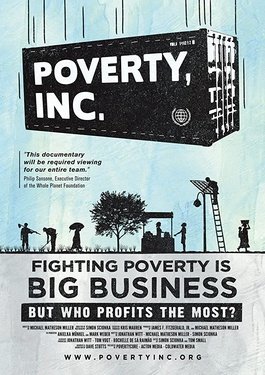This post is a reflection and response to the film Poverty, Inc. The film was shown at the Student Union Theater at Oklahoma State University on April 6th as part of the Engineers Without Borders club and the Free Enterprise Society.
Poverty, Inc. is an incredibly eye-opening film about the winners and mostly the losers of the poverty industry. The film details how this industry came to be and shows the astonishing unintended consequences that donating food, clothing, and other items can have on an emerging country's economy.
One of the first instances shown in the movie is the example of rice being donated to the country of Haiti from the United States. After a major earthquake, Haitians were in need of food so the U.S. gave rise to the country to feed its people. However, this supply continues even after the natural disaster is over, destroying the farming economy. Another example involves Toms shoes and how the company's donations have upended the cobbler economy in some nations. And potentially the most hurtful effect of all, the orphanage industry has boomed. Not out of need, out of desperation.
These countries receiving many items donated to them have found themselves with a lost infrastructure to create and furnish items for themselves. Many people are without employment, and scrape by with whatever is donated to them. The heartbreaking part of this situation is that the donations that are meant to be well-intended often create a much bigger problem than they solve.
I am in awe of how there are so many countries in the world without a civilized market structure caused by other nations' excess. I think what bothers me about this the most is how the governments of these nations continue to accept aid given to them because of corruption, greed, or just plain ignorance. No country is safe from these no matter how advanced its economy is.
What stood out to me is how the economies of countries receiving unnecessary aid have a very imbalanced scale of markets. There are much more small businesses than medium or even large-scale businesses. Part of the reason behind this is the government is not set up for free-market economies with basic property rights. This is so frustrating to me because although the United States government aggravates me (along with many state governments too), the corruption is much easier to see. Beyond the issue of people living in poverty is the issue of people within the government using their power for their own use and disregarding what would actually benefit their people.
A free-open market with well setup rule of law breeds competition. Competition leads to innovation. And further innovation could not only help lead many of these people out of poverty, but it could also have a massive impact on the rest of the world. Imagine an advanced scale economy in every country. There would be profound impacts on the energy, technology, food, and manufacturing industries. Solar and wind energy could potentially take over. If not even oil would be much cheaper to use as more of it would be produced. More types and quantities of food would be made, likely reducing the amount needed to produce in other areas of the world. The overall cost of goods could go down, reducing scarcity.
I realize these are big hopes. And I also realize reducing the costs of things is also not in big businesses' interest as these companies want to continue to make huge profits. Many of these companies are part of the poverty industry, which has the side effect of leaving people behind. But what we are talking about is much more than poverty, we are talking about these peoples' basic freedoms, and I think that is what this film tries to drive home.
